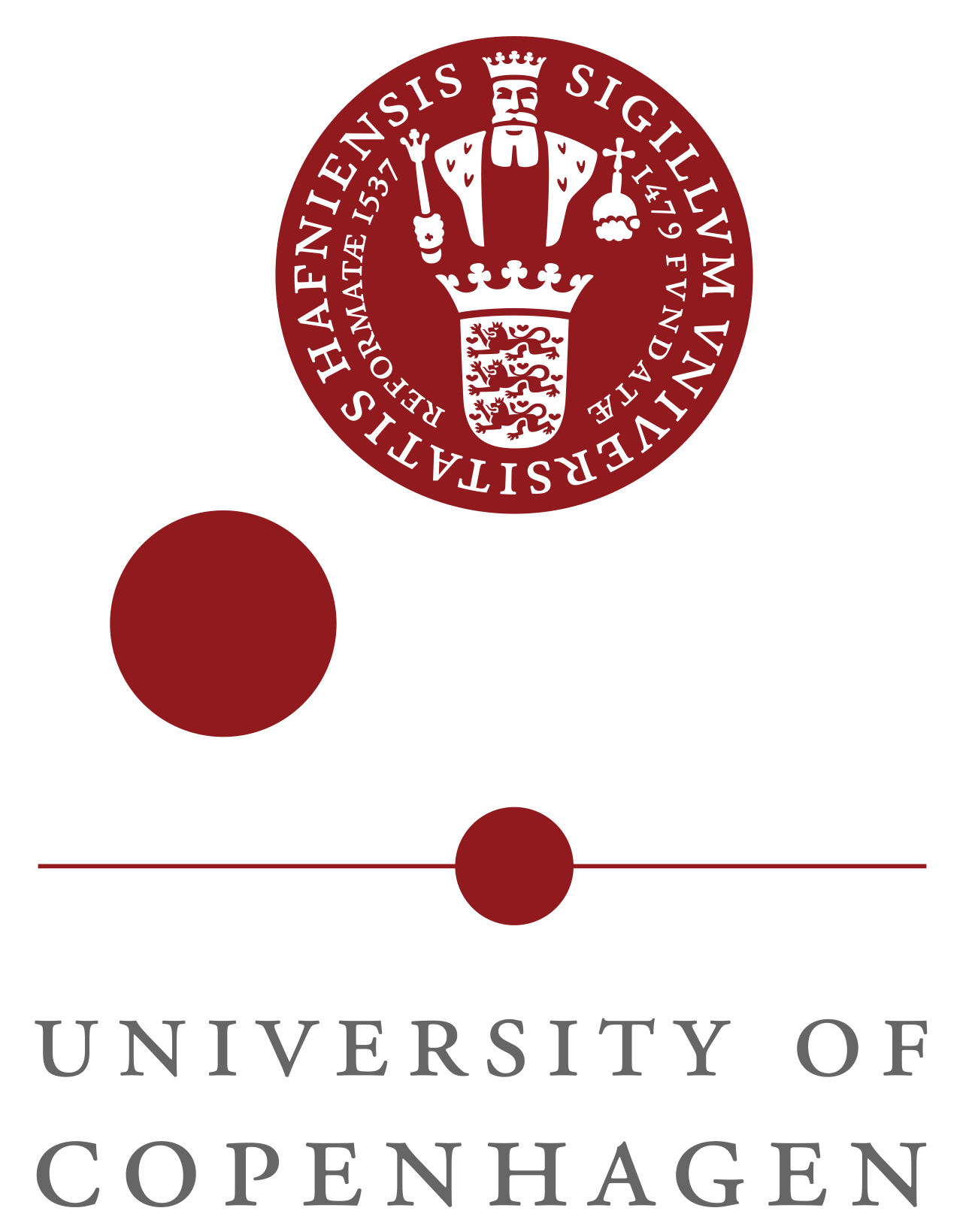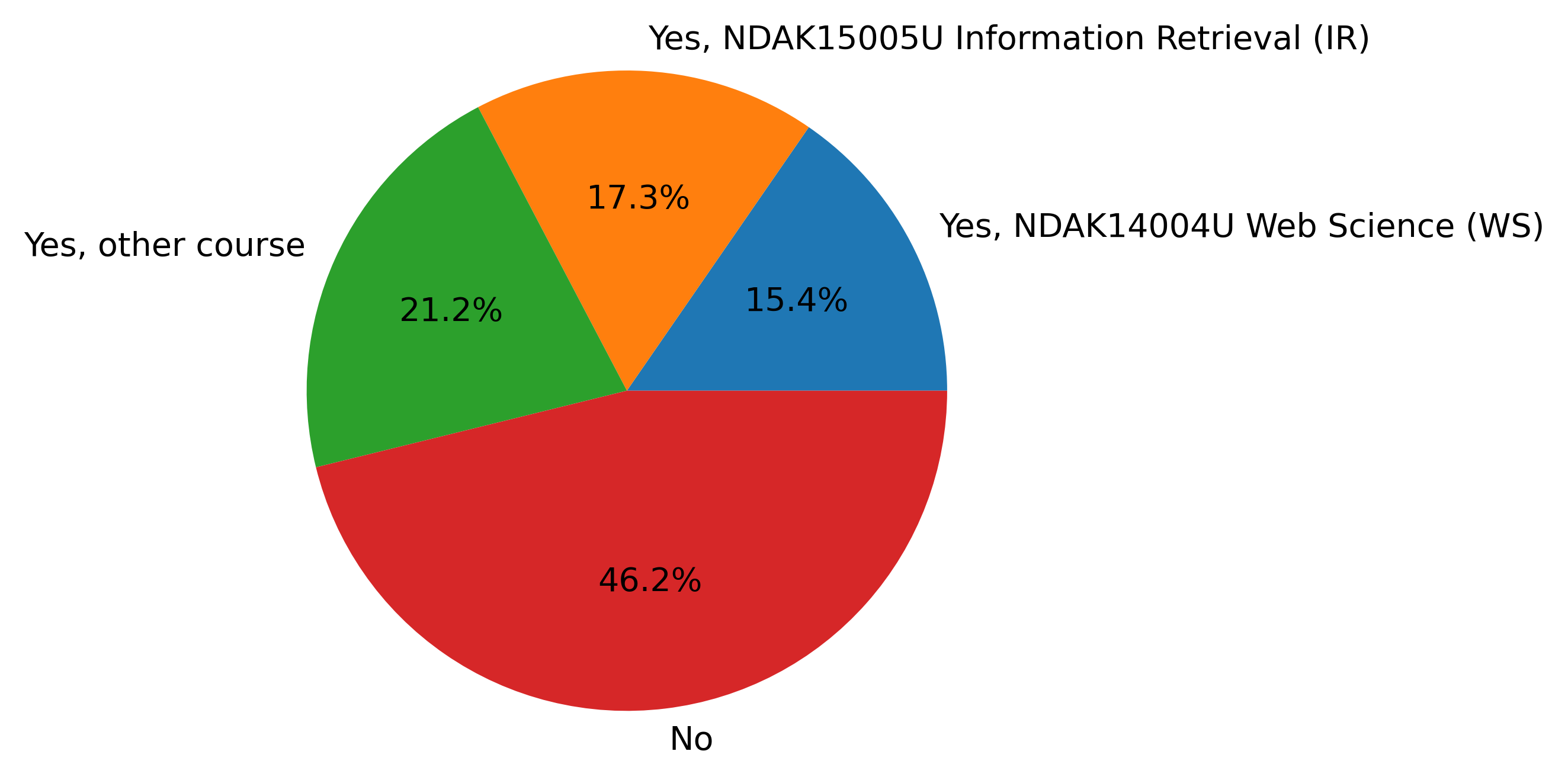Course Logistics
Contents
Course Logistics#
NDAK18000U Overview#
content at https://www.copenlu.com/nlp-book
NDAK18000U Details#
Course Responsible: Isabelle Augenstein
Lecturer: Daniel Hershcovich
Teaching Assistants: Karolina Stanczak, Erik Arakelyan, Nadav Borenstein, Ruixiang Cui
NDAK18000U Schedule#
Lectures:
Tuesdays, 13-15 in Lille UP1 (04-1-22), Universitetsparken 1, Weeks 36-41 + 43-44
Lab Sessions:
Group 1: Mondays, 10-12 in the old library (4-0-17), Universitetsparken 1, Weeks 37-41 + 43-44
Group 2: Fridays, 10-12 in the old library (4-0-17), Universitetsparken 1, Weeks 36-41 + 43-44
We will assign you to one of two lab session groups based on your answers to the Getting to Know You survey (if you have not filled it in yet, do it asap). You will receive an announcement about this before the first lab session.
NDAK18000U Syllabus (subject to small changes)#
Week 36 (5-9 Sept)
Lecture (Tuesday): Course Logistics (slides), Introduction to NLP (slides), Tokenisation & Sentence Splitting (notes, slides, exercises), Text Classification (slides)
Lab (09.09 & 12.09): Jupyter notebook setup, introduction to Colab. Introduction to PyTorch. Project group arrangements. Questions about the course project. (lab)
Week 37 (12-16 Sept)
Lecture (Tuesday): Introduction to Representation Learning (slides), Language Modelling (partially) (slides)
Lab (16.09 & 19.09): Recurrent Neural Networks and word representations. Project help. (lab)
NDAK18000U Syllabus (subject to small changes)#
Week 38 (19-23 Sept)
Lecture (Tuesday): Language Modelling (rest) (slides), Recurrent Neural Networks (slides), Contextualised Word Representations (slides)
Lab (23.09 & 28.09): Language Models with Transformers and RNNs. Project help. (lab)
Week 39 (26-30 Sept)
Lecture (Tuesday): Attention (slides), Interpretability (slides)
Lab (30.09 & 03.10): Error analysis and explainability. Project help. (lab)
Week 40 (3-7 Oct)
Lecture (Tuesday): Sequence Labelling (slides, notes)
Lab (07.10 & 10.10): Sequence labelling. Beam search. Project help. (lab)
NDAK18000U Syllabus (subject to small changes)#
Week 41 (10-14 Oct)
Lecture (Tuesday): Information Extraction (slides), Question Answering (slides)
Lab (14.10 & 24.10): In-depth look at Transformers and Multilingual QA. Project help. (lab)
Week 43 (24-28 Oct)
Lecture (Tuesday): Machine Translation (slides), Cross-lingual Transfer Learning (slides)
Lab (28.10 & 31.10): Project help.
Week 44 (31 Oct-4 Nov)
Lecture (Tuesday): Dependency Parsing (slides)
Lab (04.11): Project help.
Course Requirements#
Familiarity with machine learning (probability theory, linear algebra, classification)
Knowledge of programming (Python)
No prior knowledge of natural language processing or linguistics is required
Relevant machine learning competencies can be obtained through one of the following courses:
NDAK15007U Machine Learning (ML)
NDAK16003U Introduction to Data Science (IDS)
NDAB18000U Data Science
NDAB18003U Elements of Machine Learning
Machine Learning, Coursera
See also the course description
About You: previously taken courses in Machine Learning?#
import numpy as np
import matplotlib.pyplot as plt
# if using a Jupyter notebook, include:
%matplotlib inline
# Pie chart, where the slices will be ordered and plotted counter-clockwise:
labels = ['Yes, NDAK15007U Machine Learning (ML)', 'Yes, NDAB18003U Elements of Machine Learning', 'Yes, NDAK15018U Large-Scale Data Analysis (LSDA)', 'Yes, NDAK16003U Introduction to Data Science (IDS)', 'Yes, NDAB18000U Data Science', 'Yes, other course']
sizes = [22, 3, 1, 7, 5, 23]
plt.rcParams['figure.dpi'] = 400
fig, ax = plt.subplots()
ax.pie(sizes, labels=labels, autopct='%1.1f%%')
ax.axis('equal') # Equal aspect ratio ensures the pie chart is circular.
# ax.set_title('My title')
plt.show()
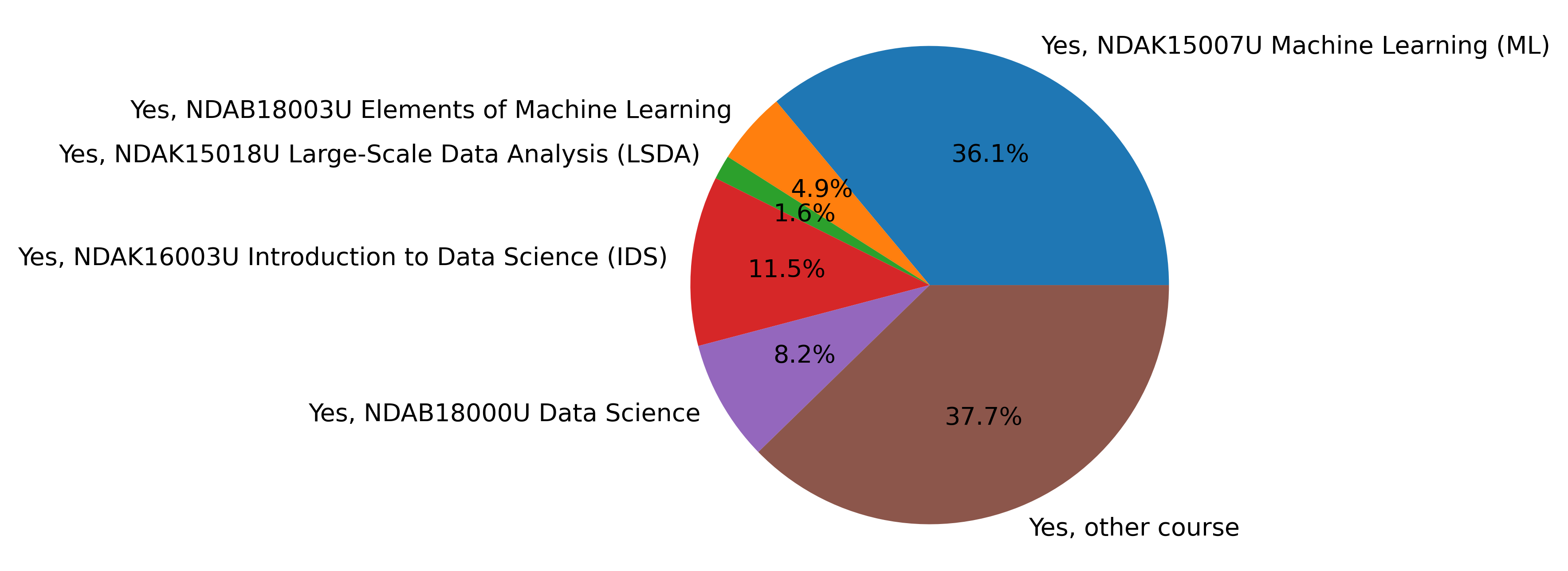
About You: experience with using neural network software libraries?#
import numpy as np
import matplotlib.pyplot as plt
# if using a Jupyter notebook, include:
%matplotlib inline
# Pie chart, where the slices will be ordered and plotted counter-clockwise:
labels = ['PyTorch', 'Tensorflow', 'Keras', 'No', 'Other']
sizes = [20, 18, 17, 4, 13]
plt.rcParams['figure.dpi'] = 200
fig, ax = plt.subplots()
ax.pie(sizes, labels=labels, autopct='%1.1f%%')
ax.axis('equal') # Equal aspect ratio ensures the pie chart is circular.
# ax.set_title('My title')
plt.show()
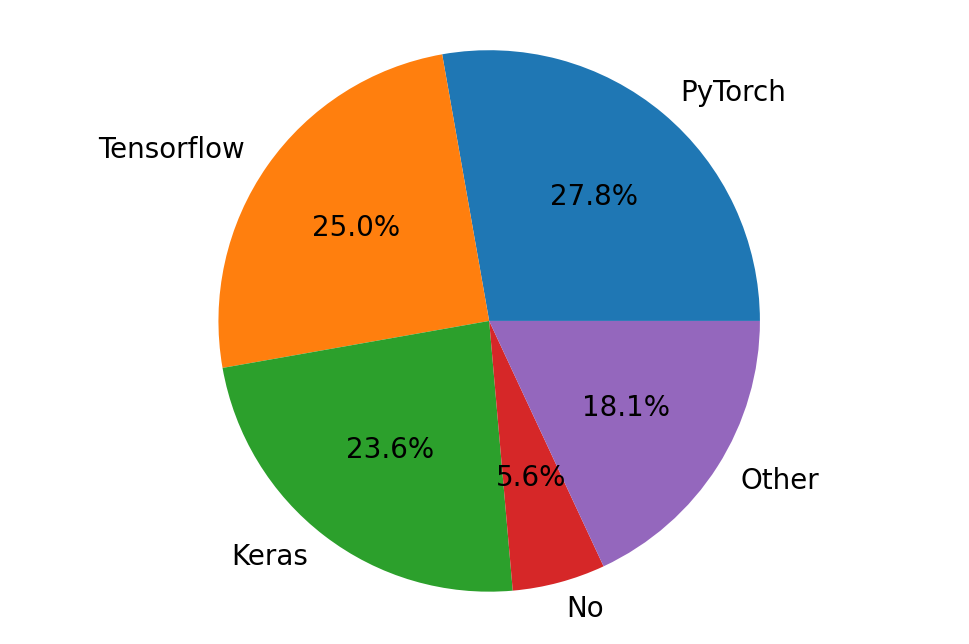
About You: degree are you enrolled in#
import numpy as np
import matplotlib.pyplot as plt
# if using a Jupyter notebook, include:
%matplotlib inline
# Pie chart, where the slices will be ordered and plotted counter-clockwise:
labels = ['MSc Computer Science', 'BSc Datalogi', 'BSc Machine Learning og Datavidenskab', 'Other MSc program', 'Other BSc program', 'Other']
sizes = [19, 2, 4, 17, 1, 1]
plt.rcParams['figure.dpi'] = 300
fig, ax = plt.subplots()
ax.pie(sizes, labels=labels, autopct='%1.1f%%')
ax.axis('equal') # Equal aspect ratio ensures the pie chart is circular.
# ax.set_title('My title')
plt.show()
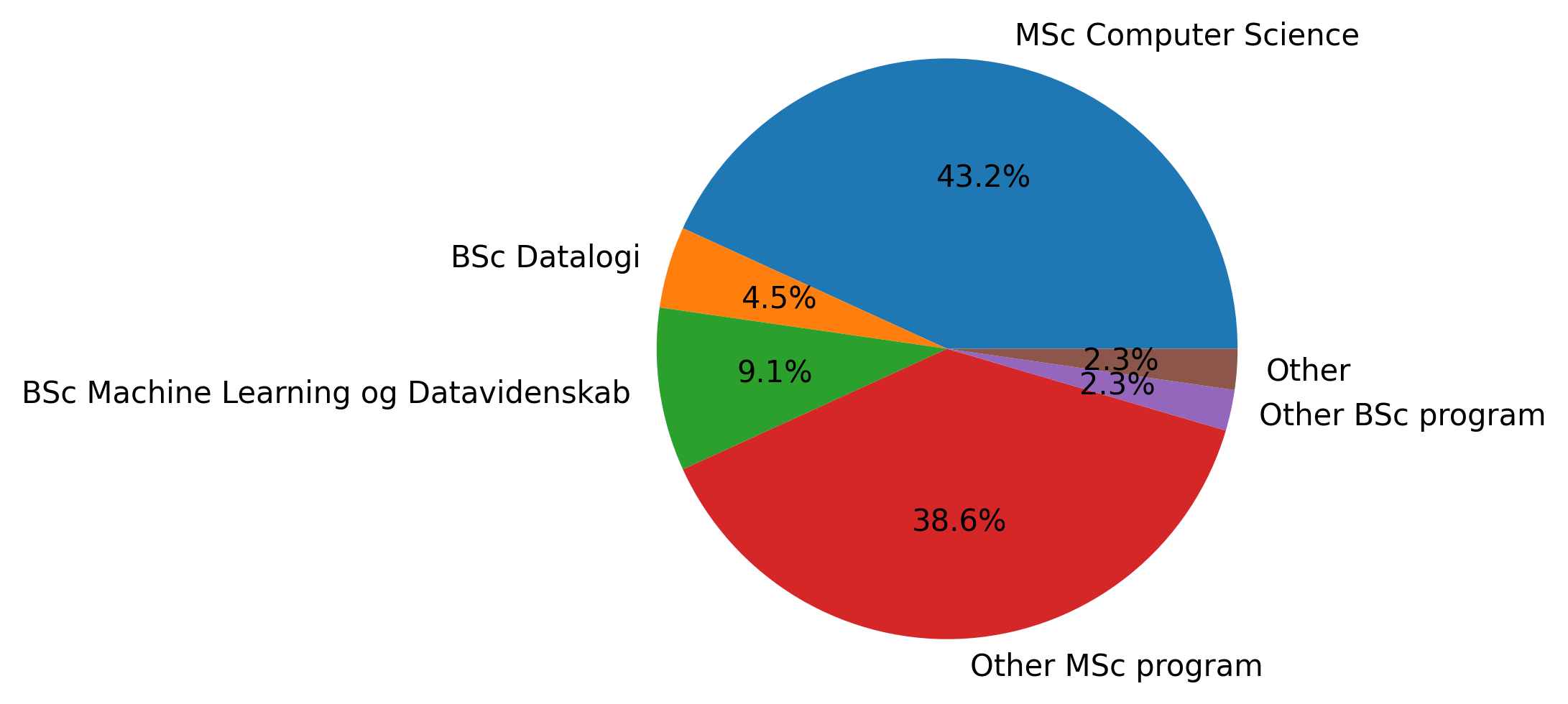
About You: what you want to get out of this course#
import numpy as np
import matplotlib.pyplot as plt
# if using a Jupyter notebook, include:
%matplotlib inline
# Pie chart, where the slices will be ordered and plotted counter-clockwise:
labels = ['getting more thorough introduction to NLP',
'learning about an interesting application of ML',
'wanting to understand what all the hype is about',
'preparing for thesis project',
'improving job prospects',
'practical skills for processing text',
'course credits']
sizes = [14, 8, 3, 7, 6, 6, 2]
plt.rcParams['figure.dpi'] = 400
fig, ax = plt.subplots()
ax.pie(sizes, labels=labels, autopct='%1.1f%%')
ax.axis('equal') # Equal aspect ratio ensures the pie chart is circular.
# ax.set_title('My title')
plt.show()
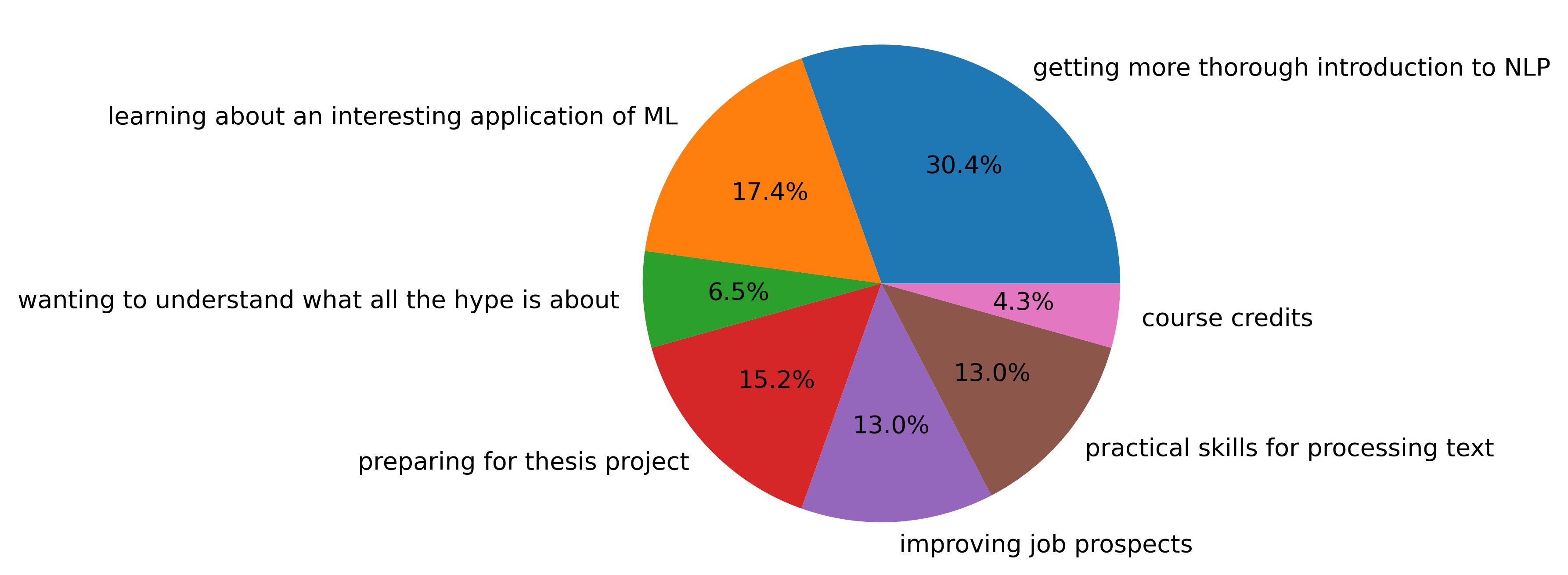
About You: what you want to get out of the lab sessions#
import numpy as np
import matplotlib.pyplot as plt
# if using a Jupyter notebook, include:
%matplotlib inline
# Pie chart, where the slices will be ordered and plotted counter-clockwise:
labels = ['step-by-step tutorials for practical topics related to the course', 'to work on the course project with my group', 'an opportunity to ask questions about the course or assignment', 'other']
sizes = [27, 32, 34, 1]
plt.rcParams['figure.dpi'] = 400
fig, ax = plt.subplots()
ax.pie(sizes, labels=labels, autopct='%1.1f%%')
ax.axis('equal') # Equal aspect ratio ensures the pie chart is circular.
# ax.set_title('My title')
plt.show()

Course Materials#
We will be using the stat-nlp-book book.
Contains interactive jupyter notes and slides
View statically here
Use interactively via Google Colab or localy, see github repo instructions
References to other material are given in context.
This is work in progress.
Course materials are adapted from a course that Isabelle co-taught at UCL (course organiser: Sebastian Riedel)
Check the website regularly for updates
Watch for updates
Please contribute by adding issues on github when you see errors (use the button in the upper right corner)
For assignment hand-in, announcements, discussion forum, check Absalon
Teaching Methods#
Course combines
Traditional lectures
Hands-on exercises
Group work
Occasional small exercises during lectures, so bring your laptop
You are expected to read some background material for each lecture
This is such that everyone is on the same page
And so that there is more time for exercises and discussions in lectures
The background material will be made available a week before each lecture
No reading material for the first lecture
Lecture Preparation#
Read Background Material
Go through lecture notes, play with code (optional)
Do exercises (optional)
Assessment Methods#
Group project (50%), can be completed in a group of up to 3 students
Released 1 September, hand-in 4 November 17:00
joint report, contribution of each student should be stated clearly
code as attachment
individual mark for each group member, based on the quality and quantity of their contributions
submission via Digital Exam
Assignment consists of several parts tied to weekly lecture topics
Assessment Methods#
Group project (50%), can be completed in a group of up to 3 students
Finding a group:
Deadline for group forming: 12 September 17:00
Offer to help you find a group – fill in the “Getting to know you” quiz by the end of first lecture day, 6 September 2022 17:00.
If you choose this option, you will be informed of your assigned group on 7 September 2022 and can still change groups by asking other students to swap groups (it’s your responsibility to arrange this though).
Otherwise, we assume you will find a group by yourself in the first course week, e.g. by coordinating with other students in the lab session
Assessment Methods#
Take-home exam (50%), to be completed individually
Released 7 November 17:00, hand-in 9 November 17:00
Exam is timed: 1.5 hours
Takes place on Absalon
When completed, submit your answers on Absalon
Theoretical exam, covering the whole course curriculum
Late Hand-In#
Late hand-ins cannot be accepted
Exceptions can be made in rare cases, e.g. due to illness with doctor’s notice
Get in touch with course responsible at least one working day in advance
Plagiarism#
Don’t do it
Don’t enable it
Check rules and consequences if unclear
Python#
Lectures, lab exercises and assignments focus on Python
Python is a leading language for data science, machine learning etc., with many relevant libraries
We expect you to know Python, or be willing to learn it on your own
Labs and assignments focus on development within jupyter notebooks
Lab Sessions#
Some lab sessions are tutorial-style (to introduce you to practical aspects of the course)
Other lab sessions are open-topic. You can use them as an opportunity to:
ask the TAs clarifying questions about the lectures and/or assignment
ask the TAs for informal feedback on your assignment so far
work on your assignment with your group
Discussion Forum#
Our Absalon page has a discussion forum.
Please post questions there (instead of sending private emails)
We give low priority to questions already answered in previous lectures, tutorials and posts,
and to pure programming related issues
We expect you to search online for answers to your questions before you contact us.
You are highly encouraged to participate and help each other on the forum.
The teaching team will check the discussion forum regularly within normal working hours
do not expect answers late in the evenings and on weekends
start working on your assignments early
come to the lab sessions and ask questions there
Copenhagen NLP#
Research Section, UCPH Computer Science Department
Faculty members: Isabelle Augenstein (head of section), Daniel Hershcovich, Desmond Elliott, Anders Søgaard
Official webpage: https://di.ku.dk/english/research/nlp/
List of group members: http://copenlu.github.io ; http://coastalcph.github.io/; https://elliottd.github.io/people.html
Twitter:
@copenlu https://twitter.com/CopeNLU
@coastalcph https://twitter.com/coastalcph
Always looking for strong MSc students
PhD positions available dependent on funding
